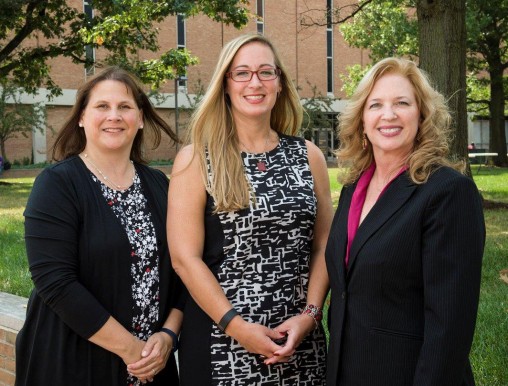
From left: Stephanie Goodwin, Jennie Buckwalter and Jennie Gallimore are latest Wright State women leaders to participate in the Higher Education Resource Services (HERS) Summer Institute. (Photo by Erin Pence)
Each year, Wright State University sponsors a select few women to participate in the Higher Education Resource Services (HERS) Summer Institute, a preeminent leadership development program that prepares women to become high-ranking decision-makers in higher education.
Since 1972, HERS has provided training for more than 5,000 women faculty and administrators on the following campuses: Wellesley College, Bryn Mawr College and the University of Denver. Roughly 30 women with Wright State connections have participated over the years.
HERS candidates at Wright State undergo a competitive screening process through the Women’s Center and are ultimately selected by the President’s Office. Once nominated, the candidates are evaluated in comparison to all other candidates from around the nation for selection by the HERS program.
This year’s HERS participants were Jennie Buckwalter, assistant dean for community and student engagement in the College of Liberal Arts; Jennie Gallimore, who was recently promoted to associate dean of research and graduate studies in the College of Engineering and Computer Science; and Stephanie Goodwin, the university’s director for faculty development and leadership.
All three attended the HERS Denver Summer Institute, a two-week session in June that attracted 64 women from a wide range of public and private universities and the military.
The HERS Institute empowers women to understand their potential and provides them with skills to grow professionally and personally and to lead with their strengths.
Buckwalter said the experience was a great opportunity for reflection.
“My time at HERS allowed me to think practically about my skillset and my work at Wright State and what I can be doing to effect change now and into the future,” she said.
Topics of sessions at the Denver Institute included roles in reinventing education, managing and leading change, budgeting and finance, diversity and inclusion, how to negotiate, legal issues, advancement and personal career development.
Goodwin said the sessions enabled the women to step away from their day-to-day responsibilities and focus on the bigger picture of the role Wright State plays in the broader landscape of higher education.
“It makes us more effective in our everyday responsibilities at Wright State while creating opportunities for us to make an impact as leaders both regionally and nationally,” she said.
Another important component of the HERS program was a focus on leadership projects that all participants were in the process of developing at their respective campuses. Women strategized with their peers and created action items to help advance their project and provide them with more tools for success.
Goodwin’s focus will be on strategies to promote effective faculty mentoring practices and policies in the coming year.
Buckwalter’s project supports the creation and development of a new college initiative, Center for Liberal Arts Student Success (CLASS), which will focus on improving student success in the classroom and in the workforce.
Gallimore is focused on the creation of continued professional development programs in the College of Engineering and Computer Science for workforce development and continued education for alumni.
Gallimore said networking with other professionals and hearing about their journeys and projects was extremely valuable.
“That was the most useful — when we leave we continue to have this wonderful network,” she said. “It’s important for women in higher education leadership roles to have strong female role models and colleagues.”
Two particularly memorable sessions featured panels of women university presidents and provosts. All participants agreed that having the opportunity to listen to their experiences and to ask questions was one of the highlights of the program.
Wright State is rich in women leaders who over the years have participated in HERS.
“I could not be prouder that Jennie Buckwalter, Jennie Gallimore and Stephanie Goodwin have joined this wonderful network of women on campus who have distinguished themselves through their commitment to serving in leadership roles,” said President David R. Hopkins. “It’s not just about the impact this experience has on the individual. I’ve noticed how this experience helps them impact others.”

 Glowing grad
Glowing grad  Wright State’s Homecoming Week features block party-inspired events Feb. 4–7 on the Dayton Campus
Wright State’s Homecoming Week features block party-inspired events Feb. 4–7 on the Dayton Campus  Wright State music professor honored with Ohio’s top music education service award
Wright State music professor honored with Ohio’s top music education service award  Wright State’s Industrial and Human Factors Engineering program named one of top online graduate programs by U.S. News
Wright State’s Industrial and Human Factors Engineering program named one of top online graduate programs by U.S. News  Student-run ReyRey Café celebrates decade of entrepreneurship at Wright State
Student-run ReyRey Café celebrates decade of entrepreneurship at Wright State 